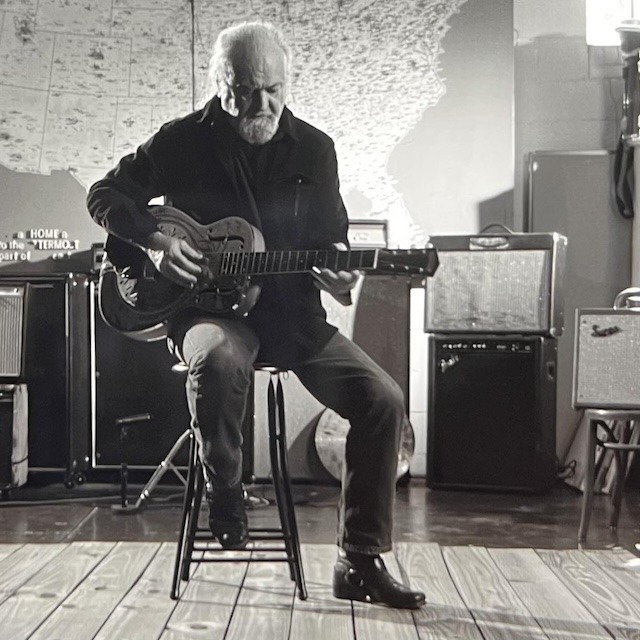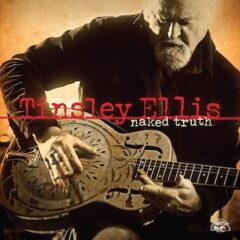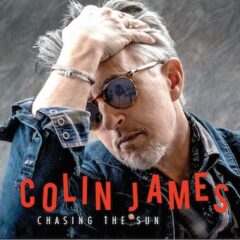Reviews by David McGee
Tinsley Ellis
Alligator Records
Tinsley Ellis, normally fronting a blistering blues-rock juggernaut, has delivered a long-awaited gem: deep, potent acoustic blues, featuring Ellis, his lived-in voice, his 1937 National Steel O Series guitar, his 1969 Martin D-35 (a treasured gift from this father), and percussive flourishes provided by his clapping hands and stomping feet. Of the dozen songs, only three are covers, including a lovingly rendered version of Leo Kottke’s instrumental beauty, “Sailor’s Grave on the Prairie,” complete with those evocative Kottke slide swoops, precision-picked single note lines and poignant melody evoking the feel of an endless horizon. Ellis also burns righteously in covering Son House’s monument, “Death Letter Blues,” delivered in a deep, frighteningly wounded voice spitting out the verses with unalloyed, self-lacerating fury while complementing the horror he experiences with a powerhouse guitar attack alternating between banshee-like slide howls and angry comping. His own songs assay blues styles from the Mississippi hill country (the spooky “Devil in the Room”) to the Delta’s dark heart in the spare Bentonia blues and wounded, upper register 12-bar lamentations of “Windowpane,” with a touch of Robert Johnson’s saucy humor in the lusty bounce fueling “Grown Ass Man”’s come-on. Blues album of the year? You read it here first. –David McGee

‘Death Letter Blues,’ Tinsley Ellis, from Naked Truth

‘Windowpane,’ Tinsley Ellis, from Naked Truth
***
Colin James
Stony Plain
Twenty-one albums into his career, veteran Canadian bluesman Colin James is very much in possession of his fastball on the captivating Chasing the Sun. In the “a little help from my friends” category, James is aided by his co-producer, Colin Linden, himself a gifted guitarist and songwriter in addition to his mastery behind the board on this, his sixth album with James. In fact, one of the highlights here is a stomping take on a Linden-Paul Reddick copyright, “Devilment,” complete with a raucous Chicago vibe and Charlie Musselwhite adding spry, keening harp touches to the proceedings, fashioning a stinging sonic warming to the lyrics’ wary regard of a certain femme fatale as expressed in James’s impassioned, accusatory vocal. The powerhouse rhythm section throughout is comprised of seasoned vets Daryl Jones (bass) and Paul Drayton (drums), whose resumes include major projects with household names from the rock, folk and jazz worlds. In addition to Musselwhite, other memorable guest cameos feature Lucinda Williams joining in on a verse of her self-penned urgent plea for “Protection,” the album opener to which Ann and Regina McCrary add gospel-infused intensity as they do on the album closer, James’s (a co-write with Tom Wilson) gritty appeal for tolerance and understanding articulated amidst an ominous, swampy, swirling ambiance in “Open Your Mind.”
Whether working in a basic band configuration or showing off an effective changeup (torturing the baseball metaphor here) in an acoustic-electric trio lineup, James digs deep at every turn. With Linden joining James on electric guitar and Janice Powers and Michael Hicks, respectively, adding moody B3 flourishes, James, his tenor as plaintive as ever, offers a potent pair of introspective laments in the Allmans-ish “Star Studded Sky” followed by the heartbreaking regrets of “Too Far Gone.” Elsewhere, the stripped-down trio of James, Linden and Powers fashion a murky ambience suitable to underscore the delusional mindset of Paul Butterfield’s “In My Own Dream.” From delusion to deceit, Musselwhite adds a howling, aggrieved harp in joining James and Linden in a raw, haunting take on the mean woman Delta blues of John Hammond’s “Come to Find Out.” Repeat listenings are rewarded aplenty here. –David McGee

‘Too Far Gone,’ Colin James, from Chasing the Sun

‘Come to Find Out,’ written by John Hammond. Colin James with Charlie Musselwhite on harp From Chasing the Sun.
***
 POSITIVELY 4TH STREET: A TRIBUTE TO BOB DYLAN
POSITIVELY 4TH STREET: A TRIBUTE TO BOB DYLAN
Rory Block
Stony Plain Records
Fifty-nine seconds into the opening track of Rory Block’s moving tribute to Bob Dylan, she growls “Everything is broken.” In that instant, over her own swooping slide guitar lines and stomping percussion support, the sense of something important unfolding is manifest. The album’s first two of nine songs—“Everything is Broken” and “Ring Them Bells”—are from Dylan’s spiritually resonant 1989 album, Oh Mercy; the last two—“Mother of Muses” and a 20-minute “Murder Most Foul”—are from his 2020 masterpiece, Rough and Rowdy Ways. In between are one anguished solo acoustic gem from Time Out of Mind (“Not Dark Yet”) and three stone classics beginning with “Like a Rolling Stone.” In her stark readings and instrumental atmospherics, Block does nothing less than heighten what Dylan calls “the dread realities of life”—this, at a time when everything does indeed feel broken. As a blues singer she’s completely tapped into the ancient foundations of Dylan’s songs and, with vision clear and unwavering, takes them all to a place where we hear them, and Dylan, with new ears. The jaunty take on “Mr. Tambourine Man” allows some light into the proceedings but otherwise Positively 4th Street speaks profoundly to a time of darkness ascendant. –David McGee

‘Positively Fourth Street,’ Rory Block, from Positively Fourth Street: A Tribute to Bob Dylan

‘Everything is Broken,’ Rory Block, from Positively Fourth Street: A Tribute to Bob Dylan
***
Kenny Wayne Shepherd
Mascot/Provogue Records
Kenny Wayne Shepherd was all of 18 when his first album, 1995’s platinum-certified Ledbetter Heights, vaulted him into the blues-rock pantheon. Now 47, Shepherd is far more introspective and biographical in his writing than was his younger fire-breathing self to the point where even his covers sound personal. Dirt On My Diamonds, the second volume of a project Shepherd began in 2023, written and recorded at FAME Studios in Muscle Shoals, finds the artist and his seasoned band (which includes Stevie Ray’s drummer Chris “Whipper” Layton) at a creative and emotional peak, guitars sizzling, howling and wailing from the git-go, the rhythm section taught and propulsive, the bluesy vocals by Shepherd and his long-time compadre Noah Hunt impassioned, urgent and sensitive. Among the eight tracks is a stomping, seemingly autobiographical account of love triumphing over ambition in “I Never Made It To Memphis” (“I never knew I’d get lost in something that feels so right”); a slow-boiling, horn-infused bit of southern soul, “Watch You Go,” with Hunt lamenting the one that got away; and a broken-hearted Shepherd vocal decrying things gone wrong to the point where “My Guitar is Crying.” The lone cover among the eight cuts here? A blazing take on ZZ Top’s “She Loves My Automobile,” a double-entendre masterpiece featuring Shepherd’s muscular vocal over pounding percussion and relentlessly pumping horns aiding and abetting his soaring upper neck soloing. Hot stuff, all of this, but with a great big heart driving it. –-David McGee

‘My Guitar is Crying,’ Kenny Wayne Shepherd, from Dirt On My Diamonds, Vol. 2

‘She Loves My Automobile,’ Kenny Wayne Shepherd covers ZZ Top on Dirt On My Diamonds, Vol. 2
***
Anthony Geraci
Blue Heart Records
Imagine for a moment that Tears in My Eyes, Anthony Geraci’s latest gem, is a vinyl record. If it were, a listener could drop the tonearm on a heated, Allmans-inspired workout, “Witchy Ways,” complete with a gritty vocal warning of a certain woman’s alluring appeal by Barrett Anderson (who’s also supplying those familiar slide guitar howls) amid a swirling soundscape keyed by Geraci’s spirited workout on the 88s; or you could set it down on “Lonely Country Blues,” a lovely but winsome instrumental in which Geraci’s aching piano melody—with its trills doing justice to the memory of Floyd Cramer–is bolstered by an equally evocative Anderson guitar solo, all blending to make the title sentiment ever more vivid and even more lonely and isolated than the title admits; or drop it down on the album opener, a lowdown blues called “Broken Mirror, Broken Mirror,” bemoaning a raft of bad luck and trouble, potently rendered vocally by Geraci’s former boss in the Bluetones, Sugar Ray Norcia (who makes two more memorable appearances here, divesting himself of a lowdown, aggrieved report from a man falsely accused of murder in “Judge, Oh Judge,” a blues ballad made doubly deep by Mario Perrett’s plaintive sax solo, all cries and wails; and delivering a performance from deep in despair on “Now What,” a wrenching account of a relationship falling apart [“I couldn’t see your tears/through the ones in my own eyes”], with Geraci’s mournful piano solo and gently weeping Hammond organ seconding that emotion ahead of saxophonist Drew Davies adding charged emotion to the soundscape before Sugar Ray re-enters pleading for diving guidance to make things right). Guest violinist Anne Harris has her moment in the sun adding tender, airy string discourse to the laid-back groove of the instrumental “Memphis Mist,” which offers a soothing vibe not often associated with the Crescent City. Or dop that tonearm down on the third cut, the title track, “Tears in My Eyes,” with its driving rock ‘n’ roll tempo, a wild-eyed Barrett Anderson vocal, Geraci underpinning the heated urban soundscape with lively piano and organ, and darn if it doesn’t sound like a lost track from Springsteen’s early years, circa The Wild, The Innocent and The E Street Shuffle.

‘Tears in My Eyes,’ Anthony Geraci with his Boston Blues All Stars, the title track from the new album

‘Witchy Ways,’ Anthony Geraci with his Boston Blues All Stars, from Tears in My Eyes

‘Lonely Country Road Blues,’ Anthony Geraci with his Boston Blues All Stars, from Tears in My Eyes
Behold a fully formed work of musical mastery by Geraci and his stalwart Boston Blues All Stars at their apex (in addition to Anderson, it’s drummers Marty Richards and Kurt Kalker and bassist Paul Loranger). The setlist even includes a tender piano-based instrumental, “Blues for Willie J.,” in honor of the late Willie J. Campbell, Geraci’s bandmate in the Proven Ones. Through myriad tones and textures and creative arrangements, Geraci leads his mates on a fruitful journey that, in the end, proves the truth of Walter Trout’s succinct liner notes. To wit: “Along with his stellar band, he continues to put out vital and heartfelt art. His playing continues to be about honesty, tradition, invention, expression, and even humor.” So let it be written… –David McGee







